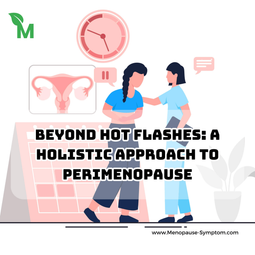Menopause is a natural and inevitable part of a woman's life, typically occurring between the ages of 45 and 55. It marks the end of a woman's reproductive years and brings about a variety of physical and emotional changes. One of the most common and bothersome symptoms of menopause is hot flashes. In this blog post, we will dive deeper into the connection between menopause and hot flashes, their possible causes, and ways to manage and reduce their frequency and intensity.
Hot Flashes: A Common Symptom of Menopause
Hot flashes are experienced by nearly 75-85% of menopausal women. They are sudden, temporary sensations of intense heat that can last for a few seconds or several minutes. They are often accompanied by sweating, rapid heart rate, and flushing of the face. While some women experience mild hot flashes, others may have severe and frequent episodes that disrupt their daily activities and sleep patterns.
What Causes Hot Flashes During Menopause?
The exact cause of hot flashes during menopause is not fully understood. However, it is believed to be related to changes in levels of the hormones estrogen and progesterone. As a woman's body adjusts to lower levels of these hormones, the hypothalamus (the part of the brain that regulates body temperature) can become overactive and trigger a hot flash. Other factors such as stress, alcohol consumption, and spicy foods may also contribute to hot flashes.
Managing Hot Flashes: Tips and Techniques
While hot flashes cannot be completely prevented, there are various techniques and lifestyle changes that can help manage them. Dressing in layers, avoiding triggers, and practicing relaxation techniques like deep breathing and meditation can help reduce the frequency and intensity of hot flashes. Regular exercise and a healthy diet can also help alleviate symptoms. Additionally, certain supplements like black cohosh and vitamin E may provide some relief for some women.
Hormone Replacement Therapy for Hot Flashes
Hormone replacement therapy (HRT) is another option for managing hot flashes. It involves taking medications that contain estrogen and/or progesterone to replace the hormones that the body is no longer producing. While HRT can be highly effective in relieving hot flashes, it is not suitable for all women and may come with potential risks and side effects. Therefore, it is important to discuss the pros and cons of HRT with your doctor before starting the treatment.
This is the chance to share a short quote. It can help generate interest by summarizing your post. Use quotes to support your writing and make it more credible to readers, or act as fascinations to break up your writing.
Menopause and hot flashes go hand in hand, but there are ways to manage and reduce their impact on daily life. Whether it's through lifestyle changes, natural remedies, or hormone replacement therapy, it's important to find what works best for you. Don't be afraid to seek advice from your doctor and explore different options. With the right approach, you can make the menopausal journey a much more comfortable and manageable one.
Source: Team MPS compiled, analyzed and wrote. Please dont reup without source of us. Many thanks.




